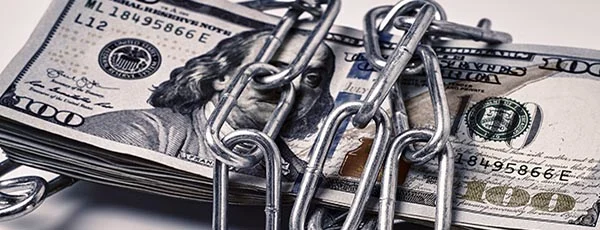How to Open a Bank Account That No Creditor Can Touch

UpdatedJul 2, 2025
- Creditors can, in some cases, take money from your bank account. It’s called a levy or garnishment.
- Most creditors must sue you and win a judgment to levy your bank account.
- Separating protected income could shield your money from a bank account levy.
Table of Contents
- What Is a Bank Account Levy?
- How Does a Bank Account Levy Work?
- Four Strategies to Open a Bank Account That No Creditor Can Touch
- Can Creditors Levy Your Bank Account Without Telling You?
- How Much Can Creditors Take With a Bank Account Levy?
- How Often Can a Bank Account Levy Happen?
- What Types Of Bank Accounts Can Be Levied?
- What To Do If Your Bank Account Is Levied
- Can You Hide Bank Accounts From a Bank Account Levy?
A bank account levy (sometimes called bank garnishment) is when creditors take money from your bank account to settle debts you owe. This typically requires that a creditor sues you, wins, and gets a court judgment.
Once a levy is issued and given to the bank, your bank could freeze your account, allowing deposits but blocking withdrawals.
You can take steps to shield your funds from a bank account levy.
What Is a Bank Account Levy?
A bank account levy is when creditors legally take funds from your bank account to pay a debt, usually after winning a court judgment against you. The term "garnishment" is sometimes used, but it more often applies to wages. "Levy" and “attach” are more specific to bank accounts.
Certain institutions, like the IRS, can apply a levy without a court order, but it typically doesn’t happen before you’re notified. When levied or attached, your account is frozen, restricting access to your money.
How Does a Bank Account Levy Work?
Most creditors follow these steps to levy your bank account:
File a lawsuit to prove you owe the debt.
Get a judgment by winning the case (note: If you don’t appear in court, the creditor wins automatically).
Request a levy order from the court.
Deliver the order to your bank, which freezes your account.
Exceptions to this process exist. The IRS and U.S. Department of Education are allowed to levy without a court order for tax or student loan debts, respectively, but must provide notice. If you default on a loan with your bank or credit union, they could use something called the "right of offset" to take funds from your bank account without telling you first.
What happens during a bank account freeze?
When creditors levy your bank account, your account is frozen. You can deposit money, but withdrawals are blocked. Checks could bounce, triggering fees. Some states allow limited access to funds for essentials like rent or food. You have to request this in court unless your state is among those that automatically protect a portion of your balance.
Four Strategies to Open a Bank Account That No Creditor Can Touch
Provided you haven’t been levied yet, the following four strategies can help protect your funds.
1. Keep your money in a qualified retirement account
Federal law shields qualified retirement plans such as 401(k) and 403(b) accounts from creditors. Individual retirement accounts (IRAs) lack federal protection, but some states exempt them from a bank account levy. Check your state’s regulations to confirm.
2. Open state-protected accounts
Certain states offer accounts protected from a bank account levy:
Tenancy by Entirety accounts: Available in states like Florida, these joint accounts for married couples may be safe from creditors when only one spouse owes the debt.
Exempt fund accounts: Some states protect a small balance. For example, New York shields $1,716 in some situations.
Research your state’s laws or talk to an attorney for options.
3. Use dedicated accounts for federal income
Income exempt from a bank account levy includes:
Government benefits: Federal payments like Social Security, veterans benefits, and military pay (protected under federal law)
Child support: Often exempt under state law
Wages: Some states limit wage garnishment, or exempt the head of household’s salary.
Open a separate account for these funds to avoid mixing them with other deposits. For example, direct-deposit Social Security into a dedicated account—federal law protects up to two months’ worth of benefits.
4. Consider offshore accounts
An offshore bank account is an account held outside the U.S. Keeping your money outside the U.S. may complicate a bank account levy for creditors. Basically, creditors must jump through more hoops to levy your account. However, risks include:
Compliance with U.S. laws like the Foreign Account Tax Compliance Act (FATCA)
Loss of U.S. legal protections
Pursuit by creditors through international courts.
It’s complicated, so you’ll want to talk to a professional about it. Find a knowledgeable adviser who has experience with the relevant legal requirements.
Can Creditors Levy Your Bank Account Without Telling You?
Most creditors must tell you before a bank account levy.
What it typically looks like:
They sue you and win a judgment.
They request court permission to levy your account, notifying you of the proceedings.
The IRS and certain federal agencies can levy without a court order, though notice is required. Once the bank receives the levy order, it can freeze your account immediately.
How Much Can Creditors Take With a Bank Account Levy?
A bank account levy lets creditors take the amount specified in the court judgment, including the debt, interest, and fees. Unlike wage garnishment, which has limits, a levy can seize your entire account balance up to the judgment amount.
How Often Can a Bank Account Levy Happen?
Each creditor with a judgment can request a bank account levy. Multiple creditors can therefore mean multiple levies. A levy lasts until the debt is paid or the judgment expires (typically after several years), though creditors can renew it.
What Types Of Bank Accounts Can Be Levied?
Most accounts, including checking, savings, and joint accounts, are vulnerable to a bank account levy. Some states protect joint accounts or exempt funds, but this varies by location.
What To Do If Your Bank Account Is Levied
If a bank account levy occurs, you can:
Negotiate: Contact the creditor to suggest a repayment plan.
Ask for exemptions: Request court relief for essentials if you missed the initial hearing.
Get legal help: An attorney can advise you on how and whether to challenge the levy.
It’s easier to prevent an account levy than it is to reverse it. Once your account is levied, solutions shift from financial to legal. Once the legal issues are sorted, you can create a financial plan to handle the situation. This may involve consulting a credit counselor to create a debt repayment plan.
If a bank account levy puts you in financial hardship, you might qualify for certain debt relief strategies. Debt settlement, for example, is when your creditor agrees to accept less than the full amount you owe and forgive the rest. Sometimes creditors are willing to do this if it looks like their best chance of recovering any money at all on the debt. If your cash is legally claimed by one creditor, other creditors might be willing to work out an agreement.
Can You Hide Bank Accounts From a Bank Account Levy?
Hiding accounts from a bank account levy is nearly impossible.
After a judgment, creditors can file a "Motion for Examination of Judgment Debtor," requiring you to list what you own for the court (this process is known as a debtor’s exam). Lying would put you at great risk. You could be charged with perjury, which is a criminal offense that can lead to fines or jail time.
It’s illegal to hide money from creditors by moving it offshore or into a separate bank account after you’ve been levied. Once you’re levied, creditors can check your accounts for suspicious transfers. If you skip the law, they are likely to find out and bring more charges against you in court.
Debt relief by the numbers
We looked at a sample of data from Freedom Debt Relief of people seeking credit card debt relief during May 2025. This data reveals the diversity of individuals seeking help and provides insights into some of their key characteristics.
Credit Card Usage by Age Group
No matter your age, navigating debt can be daunting. These insights into the credit profiles of debt relief seekers shed light on common financial struggles and paths to recovery.
Here's a snapshot of credit behaviors for May 2025 by age groups among debt relief seekers:
| Age group | Number of open credit cards | Average (total) Balance | Average monthly payment |
|---|---|---|---|
| 18-25 | 3 | $8,864 | $274 |
| 26-35 | 5 | $12,615 | $380 |
| 35-50 | 6 | $16,479 | $431 |
| 51-65 | 8 | $17,240 | $528 |
| Over 65 | 8 | $17,811 | $498 |
| All | 7 | $15,142 | $424 |
Whether you're starting your financial journey or planning for retirement, these insights can empower you to make informed decisions and work towards a more secure financial future
Student loan debt – average debt by selected states.
According to the 2023 Federal Reserve Survey of Consumer Finances (SCF) the average student debt for those with a balance was $46,980. The percentage of families with student debt was 22%. (Note: It used 2022 data).
Student loan debt among those seeking debt relief is prevalent. In May 2025, 27% of the debt relief seekers had student debt. The average student debt balance (for those with student debt) was $48,703.
Here is a quick look at the top five states by average student debt balance.
| State | Percent with student loans | Average Balance for those with student loans | Average monthly payment |
|---|---|---|---|
| District of Columbia | 34 | $71,987 | $203 |
| Georgia | 29 | $59,907 | $183 |
| Mississippi | 28 | $55,347 | $145 |
| Alaska | 22 | $54,555 | $104 |
| Maryland | 31 | $54,495 | $142 |
The statistics are based on all debt relief seekers with a student loan balance over $0.
Student debt is an important part of many households' financial picture. When you examine your finances, consider your total debt and your monthly payments.
Manage Your Finances Better
Understanding your debt situation is crucial. It could be high credit use, many tradelines, or a low FICO score. The right debt relief can help you manage your money. Begin your journey to financial stability by taking the first step.
Show source
Author Information

Written by
Cole Tretheway
Cole is a freelance writer. He’s written hundreds of useful articles on money for personal finance publications like The Motley Fool Money. He breaks down complicated topics, like how credit cards work and which brokerage apps are the best, so that they’re easy to understand.
How do I get a garnishment order overturned?
It’s vanishingly unlikely that you can. Courts rarely reverse debt judgments.
You need to act before the judgment. Negotiate with the creditor to get the hearing called off. Or retain an attorney specializing in consumer debt law to act on your behalf. Or find a reputable credit counselor.
Once the judgment is in place, your only hope is to pay the creditor what’s owed (or a lower settlement sum) or agree on a repayment plan.
Is there really such a thing as a bank account no creditor can touch?
Yes, certainly. For example, if you’re a veteran and you receive disability benefits by direct deposit, up to two months’ worth of that money should be automatically shielded from a levy.
Prepaid card accounts are hard for creditors to find, so they’d be difficult to garnish. That’s a potential strategy to protect your funds from garnishment.
What funds are exempt from garnishment?
Nearly all states exempt a part of your income from garnishment.
But in most cases, you have to ask the judge at your hearing to apply for exemptions. If you fail, your state’s exemptions may not apply. In some states, the amount exempted is pitifully low.
Most federal benefits are exempt from garnishment other than in exceptional circumstances, such as when that garnishment is happening because you owe back taxes or late child support payments.
The problem here is identifying which deposits are federal benefits and which are other forms of income. The easiest way to avoid confusion is to have a separate account in which all your exempt benefits are directly deposited – and only those benefits. That way, anyone can see by glancing at your statements that the account’s contents are exempt.



